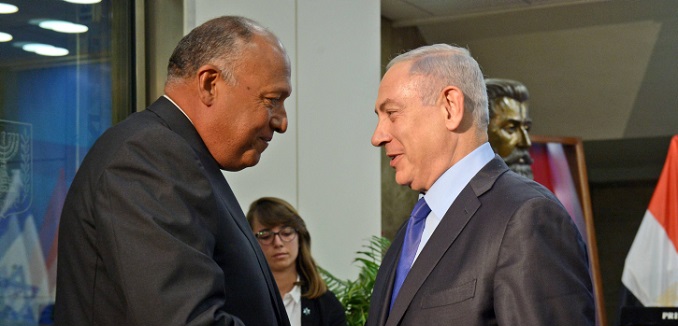Egyptian-Israeli relations are at their “highest level in history,” regional analysts told the Qatari-owned broadcaster Al Jazeera on Monday, with Cairo and Jerusalem having forged a “full partnership and unbreakable alliance.”
The two countries share mutual defense concerns, particularly the extensive coordination between Hamas and Sinai Province, an ISIS affiliate active in the Sinai Peninsula. The Palestinian terrorist group finances ISIS operations, trains its fighters in planting deadly IEDs and firing lethal anti-tank missiles, and smuggles weaponry across the border from the Gaza Strip into the Sinai.
“Egypt and Israel view the tunnel economy between the Sinai Peninsula and Gaza as a clear and present danger,” explained Oren Kessler, deputy director for research at the Foundation for Defense of Democracies. “Cairo knows that the tunnel economy enriches smugglers on the Sinai side – many of whom have ties to the local Islamic State branch – while Israel is well aware that it bolsters and arms Hamas in Gaza.” Under President Abdel Fattah el-Sisi, “Egypt has taken an uncompromising approach to destroying the tunnels, and has worked with Israel to do so,” he added.
Egypt and Israel have also upped formal diplomatic ties, with Egyptian Foreign Minister Sameh Shoukry visiting Jerusalem in July to offer his government’s assistance in restarting peace talks between Israelis and Palestinians. A month later, Shoukry defended Israeli policies to a group of high school students in Cairo.
Egypt has similarly agreed to cooperate with Israel on pragmatic issues such as desalinization and recycling, and introduced a ninth-grade textbook this spring that casts Israeli-Egyptian peace in a more positive light than previous editions. The textbook asks students to memorize the terms of the Israel-Egypt Peace Treaty of 1979 and explain the “advantages of peace for Egypt and the Arab states.”
Kessler pointed out that the warmer ties between Israel and Egypt, which have wider regional implications, are “being received with quiet approval by traditional US allies in the region, such as the monarchies of the Gulf states and Jordan, who see those relations as useful in confronting shared adversaries.”
In April, Eran Lerman, a former deputy national security advisor for the Israeli government, and Joshua Teitelbaum, an expert on Saudi Arabia and pan-Arab politics, observed that “with the need to confront Iran high above all other considerations in the Saudi and Egyptian national security playbook – and in Israel’s – any major step that helps bring together the ‘camp of stability’ in the region under joint Egyptian-Saudi leadership will also serve Israel’s interests.”
[Photo: Haim Zach / GPO / Flash90]




